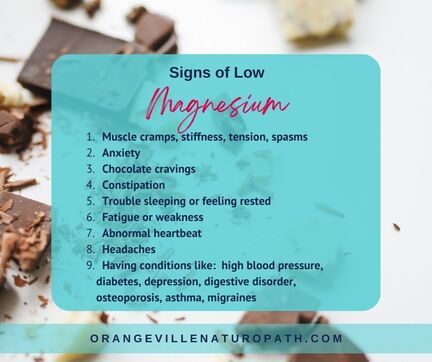Why does magnesium matter?
With over 300 jobs in the body, the demand for magnesium can exceed our intake. There's magnesium in leafy greens, nuts, legumes, avocado and chocolate, but the amount in each food also depends on the quality of the soil. We use magnesium for muscles, nerve transmission, blood pressure regulation, bone health and energy production - just to name a few precious roles. It's also essential for Vitamin D absorption.
It's suspected that up to 70-80% of us are deficient or suboptimal in our magnesium levels. It can be implicated in heart disease, diabetes, migraines, headaches, depression, anxiety and osteoporosis. Here are some signs that you might be low in this important nutrient.
Newer research has shown that people who consumed more that 550mg of magnesium per day had larger brain volumes - less age-related brain shrinkage. This benefit was most profound in post-menopausal women. It is proposed then, that higher magnesium intake may protect against neurodegenerative disease and cognitive decline from our 40s and up. (1)
What's the difference in the forms?
In supplements, the magnesium is bound to something else. That "something else" determines how and where the magnesium will be most utilized. There are also combination formulas available as well, that contain 3 or more forms within one product.
- Magnesium bis-glycinate 200-800mg/d
- I recommend this one most often because it is an all round magnesium support, it's relaxing to muscles and the mind, plus it does not act as a laxative so it is generally well tolerated
- a great time of day to take this is in the evening to promote restful sleep and reduce pain, but it can be used any time of day - Magnesium citrate 200-400mg/day (start low and work up)
- it's absorbed well, but this one is most helpful for those with sluggish digestion because it draws water into the bowel
- a popular option is "Natural Calm" - taken in the evening for relaxation it does not cause an instant relief for constipation, but bowel movements usually occur within 12 hours of taking it
- not a good option for someone with loose stools already - Magnesium malate 400mg/day
- this form is well absorbed, and is more gentle on the digestive tract
- I use it most often for those with fibromyalgia and chronic fatigue because it helps to relax muscles, relieve pain, and promote mitochondrial function - Magnesium l-threonate up to 2000mg/day
- best for brain health so it's an option for memory, dementia, depression, and concussions - Magnesium sulfate (Epsom Salts)
- used for baths and topical application for muscle relaxation and stress relief - Other forms like magnesium orotate, chloride, lactate and oxide, I don't use as often unless they are combined with other forms
Clinically, I see so many people feel a lot better just by improving their magnesium intake. I've been wondering if low magnesium status is one of the reasons that blood tests are coming back with such low Vitamin D levels. You can test your magnesium levels in bloodwork (called RBC-Mag), but it's not quite an accurate reflection of the whole body since so much magnesium is in the muscle and bone. Hair mineral analysis tests have been helpful at catching low magnesium, and I will also just recommend it as indicated and monitor based on individual symptoms. For people that have sleep trackers like FitBits or Oura Rings, they have noticed deeper and more restorative sleep after taking magnesium.
Of course our bodies never fail to amaze me! Understanding why you are taking something is a huge part of becoming your own health advocate. If you have any other topics you'd like to see covered in my email newsletters, please let me know - I'd love some inspiration!
Take care,
Dr Christa
1. https://www.sciencedaily.com/releases/2023/03/230323103415.htm

 RSS Feed
RSS Feed